|
|
|
Sort Order |
|
|
|
Items / Page
|
|
|
|
|
|
|
| Srl | Item |
| 1 |
ID:
134107
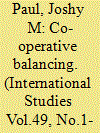

|
|
|
|
|
| Publication |
2014.
|
| Summary/Abstract |
The Asia-Pacific region is facing the threat of a number of potential military conflicts. Unresolved security challenges include the Sino-Japanese and Sino-Indian territorial disputes. The current peace and stability in the region has been achieved through various multilateral mechanisms and constant US involvement in the regional affairs. However, the declining US presence in Asia, the ineffectiveness of different multilateral institutions to establish a security order in the region and China's possible emergence as a great power in Asia may lead to the end of the status quo. In this context, it is pertinent that Asia should be free from both hegemony and power rivalry, and for that, 'co-operative balancing' is the best possible mechanism to achieve a long-term peace and stability. Co-operative balancing is a combination of power balancing and a co-operative security framework. It promotes the independent position of individual countries and strengthens the multilateral mechanisms. This essay concludes that India and Japan can balance against China while bilateral engagement among the three countries tends to reduce their distrust vis-à-vis China.
|
|
|
|
|
|
|
|
|
|
|
|
|
|
|
|
| 2 |
ID:
134108
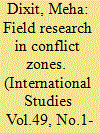

|
|
|
|
|
| Publication |
2012.
|
| Summary/Abstract |
This paper focuses on conducting research in conflict or post-conflict areas and dilemmas faced by researchers when visiting these places. It outlines some of the practical, methodological, normative and ethical issues that may engulf a researcher's mind prior to or while visiting these areas. These include access to the conflict zone, the insider/outsider debate, the feasibility of interviewing civilians and armed combatants, informed consent of the locals, the importance of the socio-cultural context, distinction between victims and perpetrators of violence, assessing trauma in conflict and post-conflict zones, and expectations of the locals. The attempt to highlight these issues does not imply that these are the only questions of concern while conducting research in conflict or post-conflict zones. However, these issues relate to the experiences of the author while travelling to such areas.
|
|
|
|
|
|
|
|
|
|
|
|
|
|
|
|
| 3 |
ID:
134106
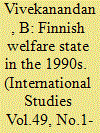

|
|
|
|
|
| Publication |
2014.
|
| Summary/Abstract |
Finland has an advanced welfare state system, which extends social protection for everyone in the country. The system is anchored in a full-employment policy, a steeply progressive taxation system, and a strong, benevolent and resourceful state, endowed with the authority to regulate the economic and social life of people. This system has been established through the institutionalization of various social insurance schemes and schemes for pensions, health care, childcare, free and compulsory education, etc. In the 1990s, the Finnish state experienced an economic crisis, borne out of flawed economic reforms like the deregulation of the financial market and other changes that aimed at hastening Finland's European Union (EU) membership. The crisis forced the government to tighten the preconditions for availing of welfare benefits. Some notable changes made during the crisis have not yet been rescinded even after it ended. Nevertheless, the crisis underlined the value of the welfare state system in helping ordinary people to successfully insulate themselves against any serious hardship during the period. As a result, the system is very popular in Finland. The Finnish welfare system today faces new challenges emanating from globalization, the EU, demographic changes and structural unemployment.
|
|
|
|
|
|
|
|
|
|
|
|
|
|
|
|
| 4 |
ID:
134104
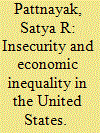

|
|
|
|
|
| Publication |
2014.
|
| Summary/Abstract |
In recent memory, the United States has lived under a heightened sense of insecurity. This sense of insecurity, which initially emanated from the terrorist attacks in September 2001, subsequently has been extended to the employment and financial sectors. As a response to terrorism, multiple Congressional laws have put added restrictions on the movement of humans, capital, and goods and services. On the whole, such policy changes have contributed to a climate of securitization of the major areas of American life. The sense of insecurity has been correlated with a level of economic inequality previously unseen in American history. It is argued that to address both issues simultaneously, the United States should foster improved relations with both Mexico and Canada. The pending legislation in the US Congress on comprehensive immigration reform may hold one of the keys to addressing the problems of both insecurity and inequality in a meaningful way.
|
|
|
|
|
|
|
|
|
|
|
|
|
|
|
|
| 5 |
ID:
134103
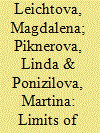

|
|
|
|
|
| Publication |
2012.
|
| Summary/Abstract |
The article presents a critical evaluation of the concepts of human development and weak statehood and outlines the relationship between them. It is argued that weak statehood has a very significant impact on the success of development strategies even if they stem from human development goals. For example, weak statehood has a direct effect on the provision or non-provision of public goods by the state. Therefore, connecting these concepts provides a perspective for analyzing various issues linked to implementation of development strategies. In conclusion, the article presents the concept of 'functional networking' as a tool for development in the anarchic environment of weak statehood. Functional networking is based on placing unmistakable emphasis on the development of individuals (daily livelihood of families), acceptance of Amartya Sen's condition of the freedom of individuals in terms of decision and opportunity, and the involvement of civil society.
|
|
|
|
|
|
|
|
|
|
|
|
|
|
|
|
| 6 |
ID:
134105
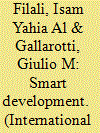

|
|
|
|
|
| Publication |
2012.
|
| Summary/Abstract |
Nations that have sought to overcome the resource curse and other barriers to economic growth have pursued, for some time, greater development through a number of strategies: from import substitution in the 1950s to current strategies based on micro-finance and human-capabilities approaches. Needless to say, the international community is still searching for the elusive Holy Grail of an optimal development strategy. One strategy that has attracted greater attention and a growing number of adherents is that of promoting the transition to a knowledge economy. This paper is about one such nation, Saudi Arabia. In analyzing the Kingdom's quest for a knowledge economy, this article hopes to shed light on the anatomy of the strategy itself and identify important preconditions for and barriers to the strategy's success. The case study of Saudi Arabia's quest for a knowledge economy carries important implications and lessons for other nations, especially those with resource economies that are seeking effective plans of economic development and transition.
|
|
|
|
|
|
|
|
|
|
|
|
|
|
|
|
|
|
|
|
|